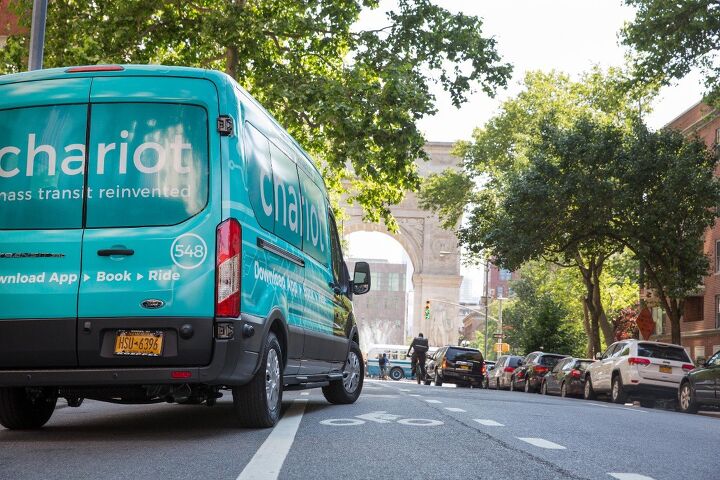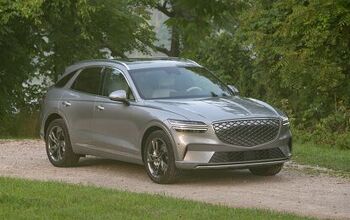Ford's Chariot Program Didn't Last Very Long

Chariot, Ford’s app-based shuttle service, has announced it will throw in the towel due to the rapidly changing “mobility landscape” of major cities. When the company launched in 2014 with Jim Hackett at the helm, it joined a bundle of “microtransit” firms hoping to undercut brands like Uber while providing a viable alternative to public transportation.
Ford acquired the company in March of 2016 for a reported $65 million, proving that not every mobility firm can be a golden goose. It snagged Hackett and made him Ford CEO roughly a year later, where he continued to oversee Chariot as chairman of the automaker’s Smart Mobility subsidiary. Unfortunately, the service is no longer deemed sustainable.
On the upside of things, this ought to put a few coins in the jar labeled “Restructuring Program” at Ford’s Dearborn headquarters.
Chariot, which serves nearly a dozen cities, conveyed the news via its blog, having unveiled a revised holiday schedule just four weeks earlier.
From Chariot:
In today’s mobility landscape, the wants and needs of customers and cities are changing rapidly. We apologize for the inconvenience this may cause Chariot’s riders and our enterprise customers. We are committed to ensuring our customers are aware of the decision and have time to make alternative transportation arrangements.
We are truly grateful to our commuters, enterprise customers, and partners for your support over the past five years. Chariot was built on a commitment to help reduce congestion, ease the commute and improve quality of life in cities, and since our start, we have provided our customers with more than 3 million rides. In addition, we helped Ford build their mobility business, and their experience with Chariot continues to inform their mobility efforts and design decisions for the future.
While the company has been active in several major cities (including New York and London), and appeared to be in good health, these types of services haven’t fared particularly well. Leap Transit permanently parked its luxury buses just three months after its 2015 launch, while Bridj moved is shuttle service out of the U.S. in early 2017 to focus on Australia.
Friday, January 25th will be the last day of Chariot services on commuter routes in the United Kingdom. The same will be true in the United States exactly one week later. All operations are said to cease by the end of March.
[Images: Ford Motor Co.]

A staunch consumer advocate tracking industry trends and regulation. Before joining TTAC, Matt spent a decade working for marketing and research firms based in NYC. Clients included several of the world’s largest automakers, global tire brands, and aftermarket part suppliers. Dissatisfied with the corporate world and resentful of having to wear suits everyday, he pivoted to writing about cars. Since then, that man has become an ardent supporter of the right-to-repair movement, been interviewed on the auto industry by national radio broadcasts, driven more rental cars than anyone ever should, participated in amateur rallying events, and received the requisite minimum training as sanctioned by the SCCA. Handy with a wrench, Matt grew up surrounded by Detroit auto workers and managed to get a pizza delivery job before he was legally eligible. He later found himself driving box trucks through Manhattan, guaranteeing future sympathy for actual truckers. He continues to conduct research pertaining to the automotive sector as an independent contractor and has since moved back to his native Michigan, closer to where the cars are born. A contrarian, Matt claims to prefer understeer — stating that front and all-wheel drive vehicles cater best to his driving style.
More by Matt Posky
Latest Car Reviews
Read moreLatest Product Reviews
Read moreRecent Comments
- Peter Buying an EV from Toyota is like buying a Bible from Donald Trump. Don’t be surprised if some very important parts are left out.
- Sheila I have a 2016 Kia Sorento that just threw a rod out of the engine case. Filed a claim for new engine and was denied…..due to a loop hole that was included in the Class Action Engine Settlement so Hyundai and Kia would be able to deny a large percentage of cars with prematurely failed engines. It’s called the KSDS Improvement Campaign. Ever hear of such a thing? It’s not even a Recall, although they know these engines are very dangerous. As unknowing consumers load themselves and kids in them everyday. Are their any new Class Action Lawsuits that anyone knows of?
- Alan Well, it will take 30 years to fix Nissan up after the Renault Alliance reduced Nissan to a paltry mess.I think Nissan will eventually improve.
- Alan This will be overpriced for what it offers.I think the "Western" auto manufacturers rip off the consumer with the Thai and Chinese made vehicles.A Chinese made Model 3 in Australia is over $70k AUD(for 1995 $45k USD) which is far more expensive than a similar Chinesium EV of equal or better quality and loaded with goodies.Chinese pickups are $20k to $30k cheaper than Thai built pickups from Ford and the Japanese brands. Who's ripping who off?
- Alan Years ago Jack Baruth held a "competition" for a piece from the B&B on the oddest pickup story (or something like that). I think 5 people were awarded the prizes.I never received mine, something about being in Australia. If TTAC is global how do you offer prizes to those overseas or are we omitted on the sly from competing?In the end I lost significant respect for Baruth.



































Comments
Join the conversation
I rode Chariot to work and back regularly in San Francisco since soon after they started. It was a great alternate to public transit for getting to and from my job in the center of the financial district. There you are looking at nearly $500 a month to park your car. But the minute that Ford took over you knew it was doomed. It was never going to return the magnitude of profits that Ford wants in its endeavors. Chariot could have supported its employees salary wise and returned a small profit to owners, but that return was always going to be equivalent to one coin laundromat's monthly returns for each Chariot Route's monthly returns. You could send your kids to college, but it better be state college. They had low prices for the early and late commuters. Late being after 6:15 PM, about when I leave work. For my evening ride I paid $3.80, about a dollar more than a city bus.
Chariot advertised heavily in my area towards the end of 2016, actually on the street outside my downtown office building. I ended up collecting multiple free ride and discount promo codes with the hopes of trying it out one day. After 2+ years, there are still only two routes in my metro area. One heads directly south (my commute is North), and another is a closed-availabilty program for a local tech company's employees only. TL:DR; I would have tried this if they ever went anywhere I needed to go.